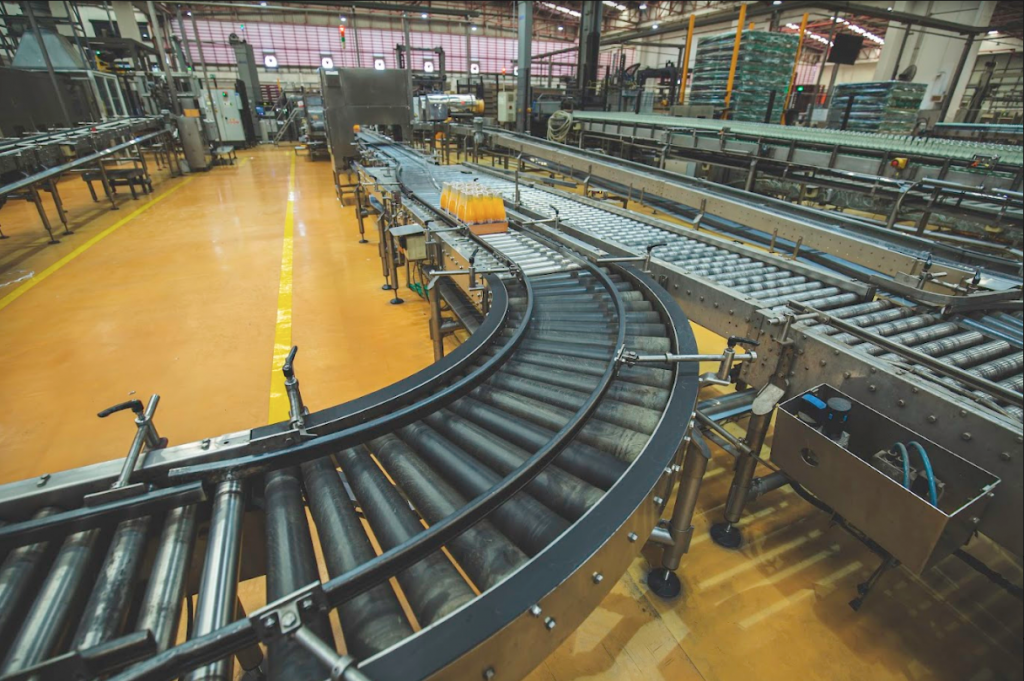Best Concrete Sealing Options for the Food and Beverage Industry

When you hear the term “food and beverage industry,” the first image your mind probably goes to is a restaurant. While restaurants are certainly part of this umbrella term, the food and beverage industry also includes the processing plants, warehouses, and factories where food is prepared, packaged, and distributed all across the country. As a result, the food and beverage industry sees a lot of floor traffic, heavy machinery, and raw spills that require drainage. These are just some of the reasons sealing is so important.
What Are Floor Sealers?
Floor sealers (also commonly referred to as sealants) are a type of chemical solution applied to the surface of a floor to protect it against routine wear and tear and other sorts of damage.
These sealants also provide a nice, glossy finish to help make your floor look more polished. Another bonus of sealing is that it can enhance your floor’s color if you previously dyed it.
Why Are Sealers Necessary?
As mentioned above, sealers are necessary to prevent floor damage. For example, concrete floors are durable and are an optimal choice for the food and beverage industry. However, concrete is a naturally porous material, so it can easily absorb dirt, grime, oil, blood, and other types of bacteria if it comes into contact with them. When a concrete floor is damaged from the inside out, it can lead to cracks and costly repair. Furthermore, it provides a slipping hazard for anyone working on their task in a dangerous area.
When it comes to the food and beverage industry, sealing can protect against these types of absorption risks, allowing your concrete floor to look and stay viable longer.
Benefits of Sealing
There are several benefits of having your floors professionally sealed. While we mentioned some of these above, such as protecting your floor against damage, there are a few other advantages you should know about:
- Can be UV-resistant. Depending on the type of sealant you use, you can turn your existing floor into one that’s UV-resistant. If a floor is not properly shielded against UV exposure, you risk the polymers breaking down. A sealant can add an extra layer of protection to your floor against this kind of damage.
- Extends the life of your floor. Most sealers can protect your floor for up to three years, significantly reducing the amount of maintenance and worry you’ll have during routine operations. Impregnating sealers go a step further and protect your floors for up to 15 years.
- It can lower your energy costs/bills. Another surprising benefit of using a floor sealer is that the gloss offers a highly-reflective coating, which can lower your energy costs.
- Hygienic and chemically resistant. As mentioned earlier, food processing plants usually have to deal with some contaminants that are hazardous to both the floor and the employees’ health. Sealants can repel these contaminants for those processing plants that require sloped floors and drainage.
Sealing Types
Now that you know the benefits of floor sealers, it’s time to learn what your options are. There are several sealers on the market that are commonly used in the food and beverage industry: acrylic, epoxy, and polyurethane.
Acrylic Sealing Options
Acrylic sealers can either be water- or solvent-based. Out of all the sealers available, these tend to be a little thinner than the others. However, one of its biggest benefits is how impossible it makes it for chemicals or dirt to fall through the concrete’s surface. Furthermore, it dries to the touch in as little as an hour.
The biggest drawback to acrylic sealers, however, is that they can break down faster than epoxy and polyurethane. As a result, you will have to reseal every few months. They also don’t fare well in low temperatures. When it comes to acrylic sealers in the food and beverage industry, they’re better used for indoor restaurants. Food processing plants or factories pose a greater risk of machinery wear and tear.
Epoxy Sealing Options
Epoxy, on the other hand, is one of the most popular forms of floor sealers for the food and beverage industry since it provides a thick protective layer that’s resistant to water and other types of chemicals. This sealant also offers a slip-resistant component. The component is perfect for factories where large amounts of food are processed and packaged. The biggest drawback to epoxy is that it doesn’t offer the best UV protection, which makes it susceptible to staining.
Polyurethane
Finally, there’s polyurethane, which offers incredible resistance to abrasion and damage caused by heavy machinery and equipment. Polyurethane, though, can take up to five days to install.
When it comes to deciding which is the best concrete sealer for the food and beverage industry, it really depends on the role you play. For restaurants and high traffic areas, acrylic will work best. Food processing plants and warehouses may benefit from polyurethane or epoxy.

